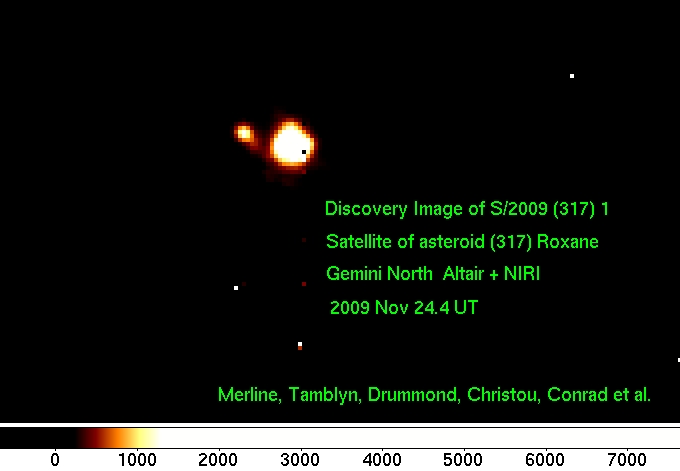
Electronic Telegram No. 2054 Central Bureau for Astronomical Telegrams INTERNATIONAL ASTRONOMICAL UNION M.S. 18, Smithsonian Astrophysical Observatory, Cambridge, MA 02138, U.S.A. IAUSUBS@CFA.HARVARD.EDU or FAX 617-495-7231 (subscriptions) CBAT@CFA.HARVARD.EDU (science) URL http://www.cfa.harvard.edu/iau/cbat.html
S/2009 (317) 1
W. J. Merline, Southwest Research Institute (SwRI); P. M. Tamblyn, Binary Astronomy, Dillon, CO, and SwRI; J. D. Drummond, Starfire Optical Range, AFRL; J. C. Christou, Gemini Observatory; A. R. Conrad, W. M. Keck Observatory; B. Carry, Observatoire de Paris, France; C. R. Chapman, SwRI; C. Dumas, European Southern Observatory, Chile; D. D. Durda, SwRI; W. M. Owen, Jet Propulsion Laboratory; and B. L. Enke, SwRI, write: "We report the discovery on Nov. 24.4 UT of a satellite of minor planet (317) Roxane from Kp-band imaging using the 8-m Gemini-North telescope (+ Altair/NIRI adaptive optics system). On Nov. 24.39992 UT, the satellite was at separation 0".27 (projected separation 245 km) and position angle 76 deg. The satellite was imaged in Kp-, H-, and J-bands and was tracked for more than 26 hours. The brightness difference in Kp-band is about 2.7 mag, giving an estimated diameter (primary diameter assumed of 19 km) of the satellite of 5 km. This binary has characteristics very similar to the other wide binaries previously reported by our group (see IAUCs 7827, 8075, 8232, 8293, 8297), all being consistent with the EEB formation mechanism of Durda et al. (2004 Icarus 170, 243). Among binaries that can be resolved by imaging, this appears to be the first E-type. Given the recent detection of dual lightcurve periods in (1509) Esclangona (CBET 2020), it is possible that separate spin periods could be extracted from lightcurve data on (317)."
NOTE: These 'Central Bureau Electronic Telegrams' are sometimes superseded by text appearing later in the printed IAU Circulars.
(C) Copyright 2009 CBAT
2009 November 26 (CBET 2054) Brian G. Marsden